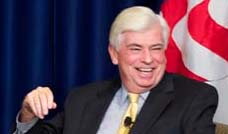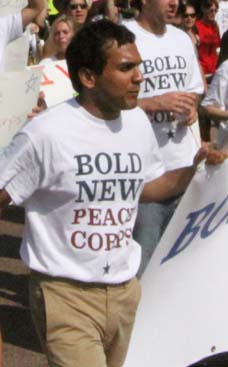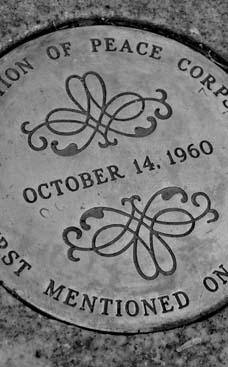
I lived in Madagascar for two years working as a Health Educator with the Peace Corps from 2003 to 2005. The United Nations Development Project had a program to build wells in the most remote villages in the arid southern part of the country where I lived. The project was simple, had an easily identifiable goal, and was well-funded by a willing community of international donors. The wells were installed and the locals enjoyed clean and easy access to drinking water for several years. Then the pumps began to break. The UNDP had no local presence, the closest office was 1,000 miles to the north. The locals lacked the parts to fix the pumps on their own because the pumps had been manufactured in Europe. And so they went back to their old way of life, fetching water from shallow rivers and the pools of rainwater that collected after the rainy season. It's easy to imagine how projects like this might be accelerated by game-like structure, but it's hard to imagine the feeling of purposeful happiness making it any longer lasting. After my two years in Madagascar, I found that the things I wanted to work on in my community-HIV education, birth control access, convincing my neighbors to start farming tomatoes instead of only cassava-were greeted with disinterest. I struggled to explain these issues in dire terms. But how do you convince someone to care about HIV when their language doesn't have a word for blood cell? How do you convince someone to grow tomatoes when it would cost them four months income to build a wooden fence big enough to keep the pigs, goats, and chickens out of their garden?
Madagascar RPCV Michael Thomsen writes: It's easy to imagine how projects might be accelerated by game-like structure, but it's hard to imagine the feeling of purposeful happiness making it any longer lasting
The Dwindling Difference Between Play and Work: Jane McGonigal's Reality is Broken
By Michael Thomsen posted at 6:00 am on January 24, 2011 4
coverProblems are matters of faith. They need to be believed in before they can be solved and their solutions are always shaped by the ways the problems are defined. In this way, Jane McGonigal's Reality is Broken: Why Games Make Us Better and How They Can Change the World founders as soon as it begins. McGonigal is a researcher at the Institute for the Future and one of the most accomplished alternate reality game designers in the world. Her book offers a solution to a problem that she doesn't really define and probably doesn't exist.
McGonigal's book is an evangelical pamphlet. It doesn't discover a new problem so much as it insists that optimism is our destiny and amusement will accelerate it if through the power of interactive systems. "Today's best games help us realistically believe in our chances for success," McGonigal declares, and so by using their essential structure for more socially beneficial purposes than killing orcs and grenade bombing aliens we might one day "change the world."
McGonigal enumerates reality's broken parts in a laundry list of suffering: obesity, global warming, starvation, poverty, the loneliness of the elderly, attention deficit disorder, and the modern rise of clinical depression. In short, games will fix everything.
It's often argued that video games are a new medium with exciting possibilities, an inheritor of the advancements of the written word and moving image that preceded them. Arguing that video games themselves constitute a medium is easy but it's an inaccurate belief, one that warps many of McGonigal's arguments.
To McGonigal, games offer us "intense, optimistic engagement with the world around us." They are defined by four essential traits: a goal, rules, a feedback system, and voluntary participation. These are a decent reduction of the new medium, but they better describe interactive systems than they do video games.
There is indeed a new medium afoot, but it's one that includes Google, World of Warcraft, Mario, and Microsoft Office. The medium is interactive system design, and video games are the non-productive, emotional face. In the way that movies occupy the same medium as training videos while serving a dramatically different purpose, video games are formed with the same essential elements as Excel. They both have a goal, respond to user input, have limits on recognizable input, and both can be taken or left.
This might seem like a small distinction but it's an essential one that confounds almost every argument in McGonigal's book. "Games aren't leading to the downfall of human civilization," McGonigal writes. "They're leading us to its reinvention." Replacing "games" with "interactive systems" makes this claim more tenable, allowing the possibility to include Wikipedia, Groupon, Facebook, LexusNexus, Google's cloud of services, and the emotional vivacity of Tetris, Ico, and Wii Sports.
"Games don't distract us from our real lives," McGonigal claims. "They fill our real lives: with positive emotions, positive activity, positive experiences, and positive strengths." This might also be true if we accept games as the artistic subset of interactive systems, but it should then be expanded beyond the scope of the "positive." All art and emotional expression is catastrophically hamstrung when limited only to the positive and optimistic.
To McGonigal's credit, Reality is Broken is filled with specific examples of games modeled around the desire to change the world for the better. She describes SuperBetter, an alternate reality game she invented after suffering a concussion in 2009. McGonigal's recovery period was long and drawn out, lasting several months during which she was instructed to avoid exertion, refrain from work, and spend as much time as possible resting.
For a woman with a proactive disposition, this state of living quickly became torturous. Rather than wallow in self-pity, McGonigal decided to make a game of her recovery. She constructed a secret identity, and then identified friends, family members, and people in her neighborhood who could play a role in her recovery.
She listed all of the negative behaviors that would slow her recover (e.g. caffeine, vigorous exercise, email, work anxiety). Then she defined specific actions that could contribute to her recovery, which she then assigned points to so that she could feel like she was making quantifiable progress (cuddling with her dog, listening to podcasts, excursion to the department store to smell different perfumes). Without this game-like structure, McGonigal's recovery was slow and painful, but within the motivational bounds of points, objectives, and identifiable "enemies" she was able to accelerate her recovery dramatically.
There are many similar examples. McGonigal describes a game that encourages social exchange between older people in retirement homes and younger people, one that assigns and tracks points for completing household chores, and one that encourages players to conduct there lives as if there was an oil shortage.
Examples like these–small in scale and benefiting from a sense of goodwill among their participants–do indeed seem to have a positive impact on their subjects. But if a game is built to solve a real world problem, is it still really a game? McGonigal's work is that it creates a framework for simplifying human experience into quantifiable objectives and positive rewards that make sense in a system but less so in "reality."
This is not a new criticism, Jaron Lanier, the author and one-time Web 2.0 developer, has long warned against designing systems that exploit human richness for simplified systemic objectives. Lanier describes a process of "lock-in," where an idea must be taken as a fact or hard rule when placed in a software system.
cover"Lock-in removes the ideas that do not fit into the winning digital representation scheme, but it also reduces or narrows the ideas it immortalizes, by cutting away the unfathomable penumbra of meaning that distinguishes a word in a natural language from a command in a computer program," Lanier wrote in You Are Not a Gadget: A Manifesto.
McGonigal veers into this territory when she talks about using games to make people happier by giving them discrete game-like objectives in their daily lives. This can create the impression of positive behavior in the short-term, but it also leads to long-term indifference and a diminution of the innumerable elements that naturally motivate us.
coverIn Bright-Sided: How Positive Thinking Is Undermining America, Barbabara Ehrenrich argues this kind of positive thinking "requires deliberate self-deception, including a constant effort to repress or block out unpleasant possibility and ‘negative' thoughts." Reading McGonigal's description of how the most successful games define their fail-states with gratuitous exaggeration to protect players from the idea of failure (e.g. there's still a humorous payoff when you lose) and it's hard to not see her optimism in these terms: a willful construct to force out naturally occurring forces to the contrary. This is less a reconciliation with reality and more a filtering of it into one that's easiest for humans to process. How this makes us "better" is unclear.
McGonigal presses further in the closing third of her book with an argument that games can change the developing world for the better. Her most recent game is EVOKE, another alternate reality game commissioned by the World Bank as a way of positively affecting development in Africa and "other parts of the world."
The game is a loose network for brainstorming with a game-like allocation of points for contribution and a fictional story to add urgency. EVOKE has led to some interesting work, including a pilot program for sustainable farming in a South African community, a project to convert glass boats into solar powered boats in Jordan, and a communal library that requires users to contribute a piece of information for every book they check out.
While these ideas all sound promising, the history of international development is littered with optimistic ideas that all sound fine in abstract. In practice, however, it's entirely unclear why EVOKE is a game and not just a philanthropic network for people with Global Giving projects.
I lived in Madagascar for two years working as a Health Educator with the Peace Corps from 2003 to 2005. The United Nations Development Project had a program to build wells in the most remote villages in the arid southern part of the country where I lived. The project was simple, had an easily identifiable goal, and was well-funded by a willing community of international donors. The wells were installed and the locals enjoyed clean and easy access to drinking water for several years. Then the pumps began to break. The UNDP had no local presence, the closest office was 1,000 miles to the north. The locals lacked the parts to fix the pumps on their own because the pumps had been manufactured in Europe. And so they went back to their old way of life, fetching water from shallow rivers and the pools of rainwater that collected after the rainy season.
It's easy to imagine how projects like this might be accelerated by game-like structure, but it's hard to imagine the feeling of purposeful happiness making it any longer lasting. After my two years in Madagascar, I found that the things I wanted to work on in my community-HIV education, birth control access, convincing my neighbors to start farming tomatoes instead of only cassava-were greeted with disinterest.
I struggled to explain these issues in dire terms. But how do you convince someone to care about HIV when their language doesn't have a word for blood cell? How do you convince someone to grow tomatoes when it would cost them four months income to build a wooden fence big enough to keep the pigs, goats, and chickens out of their garden?
It's true we have an imperfect experience of the world we live in. We struggle and fail. We tend towards dissolution over a lifetime-to understand less at the end than at the beginning. In this way, Reality is Broken is a product of the lingering adolescence of video games, a forceful assertion of general good will and ambition that will never seem more possible than in the salad years, when the medium is still unburdened by the scar tissue of failure.
Reality is Broken came from a short rant McGonigal was asked to deliver during the 2008 Game Developers Convention. The rant was inspired by a piece of graffiti McGonigal had seen in Berkeley, a sad phrase scrawled onto a sticker plastered on a wall. "I'm not good at life." This is the emotional core of every point argued in McGonigal's book. It's a work of solidarity and overwhelming empathy with everyone struggling in the world and yet no one person in particular.
One of the rants that followed McGonigal's in 2008 was by Jon Mak, a Canadian game designer and musician. Mak chose not to talk at all. Instead he started playing ambient dance music over a boombox and hopped off the dais. He ran around the conference room throwing balloons into the audience. Each balloon had an irrational message written on it, a non-sequitur snippet that teased the human tendency to search for meaning even when there is none. Without instruction the audience began hitting the balloons into the air, passing them back and forth like beach balls.
I suppose it's possible, in the collected time and energy spent passing those meaningless balloons back and forth we might instead have pooled our energies to build something, maybe creating a system to feed the homeless people wandering around the sidewalks below us. But we wouldn't have been playing at that point, and I suspect most of the people in the room would have lost interest. Which is a good reminder that there remains a vague but real difference between play and work. I finished McGonigal's book convinced it's a distinction worth keeping.















